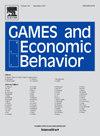Why do children pass in the centipede game? Cognitive limitations v. risk calculations
IF 1
3区 经济学
Q3 ECONOMICS
引用次数: 0
Abstract
Children and adolescents from 8 to 16 years old play the centipede game in the laboratory, where non-equilibrium behavior (passing) can occur for two reasons: an inability to backward induct (cognitive limitation) or a decision to best respond to the empirical risk and take a measured chance (behavioral sophistication). We find that logical abilities develop gradually. While young participants are (as expected) least likely to perform backward induction, those who do, tend to over-estimate the ability of their peers to behave similarly. With age, participants gradually learn to think strategically and to best respond to their beliefs about others. Overall, the centipede game is an ideal test case for studying the development of abilities, as it disentangles the causes for passing in young children and in teenagers. Interestingly, shrewdness does not transform into earnings, and we document for the first time a game of strategy where payoffs monotonically decrease with age.
为什么孩子们在蜈蚣游戏中不及格?认知限制与风险计算
8至16岁的儿童和青少年在实验室玩蜈蚣游戏,非平衡行为(通过)可能发生在两个原因:无法逆向归纳(认知限制)或决定对经验风险做出最佳反应并采取衡量机会(行为复杂性)。我们发现逻辑能力是逐渐发展起来的。虽然年轻的参与者(正如预期的那样)最不可能进行逆向归纳,但那些进行逆向归纳的人往往高估了同龄人的能力。随着年龄的增长,参与者逐渐学会战略性思考,并最好地回应他们对他人的看法。总的来说,蜈蚣游戏是研究能力发展的理想测试案例,因为它解开了幼儿和青少年通过的原因。有趣的是,精明并不能转化为收益,我们首次记录了一个收益随着年龄单调减少的策略博弈。
本文章由计算机程序翻译,如有差异,请以英文原文为准。
求助全文
约1分钟内获得全文
求助全文
来源期刊

Games and Economic Behavior
ECONOMICS-
CiteScore
1.90
自引率
9.10%
发文量
148
期刊介绍:
Games and Economic Behavior facilitates cross-fertilization between theories and applications of game theoretic reasoning. It consistently attracts the best quality and most creative papers in interdisciplinary studies within the social, biological, and mathematical sciences. Most readers recognize it as the leading journal in game theory. Research Areas Include: • Game theory • Economics • Political science • Biology • Computer science • Mathematics • Psychology
 求助内容:
求助内容: 应助结果提醒方式:
应助结果提醒方式:


